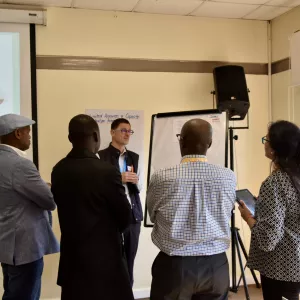An open letter to scientists: What policymakers need from you
CGIAR’s new Insight to Impact Policy Champions Network recently met to deliberate on what needs to change for food systems science to better align with, respond to, and inform global, regional, and national policies. The occasion for their discussion was the launch of CGIAR’s inaugural flagship report. In this letter, the network’s 20 policy champions articulate what they need from

An open letter to scientists: What policymakers need from you
CGIAR’s new Insight to Impact Policy Champions Network recently met to deliberate on what needs to change for food systems science to better align with, respond to, and inform global, regional, and national policies. The occasion for their discussion was the launch of CGIAR’s inaugural flagship report. In this letter, the network’s 20 policy champions articulate what they need from food system scientists to be able to leverage their findings and evidence for policy.
We represent a network of senior policy practitioners from 20+ countries and 2 regional bodies, brought together by a shared commitment to evidence-informed decision-making. Our network exists to identify national and regional policy research needs, strengthen the science–policy interface, and foster collaboration between scientists and policymakers across food, agriculture, climate, and sustainable development.
We write this letter not as critics, but as collaborators. While we recognize the value of the efforts of the research community, we believe that for research to truly shape policy, it must be designed with our realities, systems, and timelines in mind. Below, we share what we need from you—our scientist partners—so that science can better serve policy, and policy can better serve our people.
1. Address real problems
Our day-to-day is about solving real problems, and we need science to help us do that. Research that remains theoretical or disconnected from implementation has little relevance to our work.
Instead, we are looking for actionable insights and practical solutions that can support us to achieve sustainable development and long-term impacts.
2. Ground research in local realities
Our countries have national strategies, regional priorities, and unique institutional arrangements. And while we share some challenges, others are specific to our country.
Research must reflect these contexts. Avoid applying one-size-fits-all global models. Align with what is already in place, point out potential gaps which may need to be addressed, and translate into our languages, frameworks, and systems.
3. Move from insight to action
Good research doesn’t just tell us what works—it shows us how to make it work. We need to know what enabling policies are required, what institutions must be involved, and what resources are needed to move forward with a promising idea that could eventually be implemented at scale.
Without delivery plans, even strong recommendations stall.
4. Highlight trade-offs, costs, and potential gains
Every recommendation and every solution come with trade-offs. For us to make well-informed decisions, we need to understand the costs and risks associated with each proposed option—as well as the cost of not acting.
In the same way, clearly stating the expected return on investment can help us make the case for an evidence-backed approach or solution.
5. Tailor research to distinct audiences
Different actors need different types of information. Ministers want concise briefs and actionable recommendations. Technical officers need evidence-based options and implementation pathways. Extension officers want practical tools.
Design your outputs to meet these diverse needs—with summaries, infographics, pocket guides, and full reports that are structured by audience.
6. Make research easy to use
We work in time-pressured environments, often with limited technical bandwidth. Your research will go further if it is clearly structured, visually accessible, and available in digital and print formats. Pocket guides. Clear layouts. Calm colors. Big fonts. Simple language.
7. Create ongoing feedback and learning loops
A publication is not a conclusion. For research to be actioned in our context we need continuous interaction—before, during, and after a product is released. This includes feedback loops, updated guidance, and opportunities for dialogue to shape the resources you produce.
Keep the relationship alive. Don’t let your research end when your project ends.
8. Work with us from the start
Too often, policymakers are invited in at the end—to validate findings we didn’t help frame. We ask to be involved from the beginning: to co-define questions, co-interpret results, co-develop outputs, and to keep our dialogue going continuously.
Co-design builds ownership—and ensures relevance.
9. Recognize our constraints and complexities
Our policy challenges span across many sectors. Solutions must do the same. Research that only looks at one sector in isolation can miss the big picture. Also, please be mindful: what works in one country may not apply in another. Development stage, political realities, and capacity constraints matter.
In closing
We believe that policy informed by science—and science guided by policy—can transform our food systems and secure a more sustainable future. Let us build stronger bridges between evidence and action, between analysis and implementation, between research and reality.
We are ready to collaborate. We invite you to work with us—not only as scientists, but as partners in transformation.
With respect and shared purpose,
Policy Champions Network
Representing leading policy practitioners from 20+ countries and regional bodies
For more information or to contact the network, please write to Michael Victor at M.Victor@cgiar.org or James Stapleton at j.stapleton@cgiar.org.

